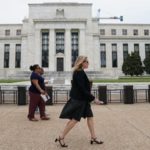US lawmakers reached a deal on Wednesday to provide 7.8 billion US dollars in emergency funding to combat the novel coronavirus disease (COVID-19), amid growing public concern and pressure on Washington and health authorities.
The bill, negotiated by leaders from both Senate and House appropriations panels, passed the lower chamber Wednesday afternoon and is expected to clear the upper chamber later this week, as the nation is reporting more deaths and confirmed cases.
Senate Appropriations Committee Chairman Richard Shelby, an Alabama Republican, called the situation a “crisis.”
“This should not be about politics; this is about doing our job to protect the American people from a potential pandemic,” he said in a statement.
Agreeing with Shelby’s assessment, Senate Appropriations Committee Vice Chairman Patrick Leahy took a shot at the White House.
The Vermont Democrat said in a statement that the bill is vastly different from the President Donald Trump administration’s proposal, which he called a “poorly thought out proposal.”
“Where President Trump’s proposal would rob Peter to pay Paul, stealing hundreds of millions of dollars from funds meant to contain an Ebola outbreak and programs the American people rely on … our agreement provides 7.8 billion dollars in new, emergency funding to address this public health threat,” he added.
According to Leahy’s statement, the package includes 3 billion dollars for research and development of vaccines, therapeutics and diagnostics; and more than 2 billion dollars to help governments at all levels prevent, prepare and respond to the crisis.
As of Wednesday afternoon, the death toll in the United States from COVID-19 has risen to 11, according to the U. S. Centers for Disease Control and Prevention (CDC) and state health officials.
A total of 129 cases of COVID-19 were reported in the United States as of Tuesday afternoon, including 49 cases involving persons repatriated from other nations.
Though US health authorities said they have taken aggressive actions and maintained “aggressive transparency,” their responses to the outbreak of COVID-19 in the nation have met with scrutiny and criticism.
The first suspected US case of a patient getting COVID-19 through “community spread” was left undiagnosed for days as the CDC initially set strict criteria for novel coronavirus testing, according to reporting by the National Public Radio.
The CDC developed a testing tool in early February, but it had only done 459 tests by the end of month, causing concerns of inadequate testing. In March, the CDC ceased to update the number of its virus tests.
Besides, the first batch of the CDC’s testing kits turned out to be defective, as some of them contained a faulty reagent, thus producing inconclusive results. The CDC admitted recently that the testing reagent might be contaminated. The Trump administration has ordered an independent investigation into it.
At a Senate hearing on Tuesday, Food and Drug Administration Commissioner Stephen Hahn pledged that about 1 million tests would be able to be performed by the end of this week.
US Vice President Mike Pence, who’s leading the White House Coronavirus Task Force, told a Tuesday briefing that the nation can have 2,500 kits out before the end of this week, which represents about 1.5 million tests.
Public and private labs in the United States, however, said that they’re unable to realize the promises that quickly, The New York Times reported.
“I have people in my state who may have been exposed. They cannot get answers about where to go, and health officials are telling us that they fear that this virus has been circulating for weeks undetected,” Senator Patty Murray of Washington said at Tuesday’s hearing.
US health authorities were also scrutinized as they quarantined COVID-19 patients.
The Department of Health and Human Services started a probe after a whistleblower said some federal workers were ill-trained and not given proper protective gears when they worked with American evacuees repatriated from overseas, according to ABC News.


